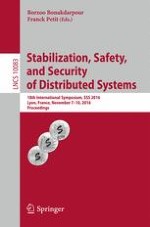2016 | OriginalPaper | Buchkapitel
Flocking with Oblivious Robots
verfasst von : Davide Canepa, Xavier Defago, Taisuke Izumi, Maria Potop-Butucaru
Erschienen in: Stabilization, Safety, and Security of Distributed Systems
Aktivieren Sie unsere intelligente Suche, um passende Fachinhalte oder Patente zu finden.
Wählen Sie Textabschnitte aus um mit Künstlicher Intelligenz passenden Patente zu finden. powered by
Markieren Sie Textabschnitte, um KI-gestützt weitere passende Inhalte zu finden. powered by
